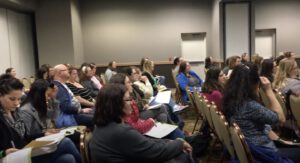KC-area homeschool conference to add student learning screenings to resources for parents
Homeschooling parents in the Kansas City area can access an additional resource this spring – learning screenings for a snapshot of their child’s developmental progress.
The Midwest Parent…

Homeschooling parents in the Kansas City area can access an additional resource this spring – learning screenings for a snapshot of their child’s developmental progress.
The Midwest Parent Educators (MPE) nonprofit will offer screenings in speech, sensory-motor skills, and reading to children at its homeschool conference and curriculum fair April 5-6 at the KCI Expo Center.
“Sometimes parents are just unsure where their children are performing in different areas developmentally,” said Suzanne Wandling, who will conduct the reading screening and is trained in the Orton-Gillingham approach. “So I think it’s going to be great for parents because they’re going to be able to get a snapshot of where their kid is performing in a particular area right now.”
The screenings come at a time when children with special needs face extra challenges in public schools, with many families considering alternative educational options.
‘Looking just for camaraderie and resources’
Conference attendees can choose from more than 70 workshops and a vendor hall featuring educational materials such as curriculum, learning programs, and other homeschool supplies.
“Sometimes when we’re homeschooling, it feels really lonely,” Wandling said in a recent MPE podcast episode. “And that’s the benefit of going to the conference because you can connect with other families who may or may not have the same needs, but who are looking just for camaraderie and resources.”
The workshops highlight specific tracks for homeschoolers using different teaching methods.
For example, “Middle/High School” addresses topics such as preparing for college, developing marketable skills, and exploring ways to handle social media and artificial-intelligence chatbots such as ChatGPT.
Meanwhile, the “Unique Learners” track caters to families with special needs.
“Kids are very excited to learn,” Wandling said, noting one behavioral sign of a child with dyslexia can be a lack of engagement with academic material. “Sometimes we think as homeschoolers, well, I can give you this book. It has all the directions. You should be able to figure it out. And sometimes kids with dyslexia, they just can’t. We have to walk them through the process and provide explicit direct instruction to help them.”
‘High level of resiliency’
Wandling also noted several myths about dyslexia further impeding parents’ ability to help their child succeed – for example, making a link between correct spelling and a student’s aptitude.
“There’s no correlation between being able to spell and your intelligence,” she said. “To be defined as dyslexic, your intelligence is at or above the average level. … Our culture has identified that if spelling is difficult, you’re not smart.”
Instead, parents should focus on the many strengths children with dyslexia can demonstrate as they cope with learning challenges.
“They’re known to be incredible out-of-the-box thinkers,” Wandling said. “They have high levels of communication where they can really connect with people in a different way.
“Another thing is that they’re super resilient because things have been hard at a very young age. They’ve learned to be super flexible, and so they have a high level of resiliency.”
Parents wondering whether their young child has dyslexia can look for behavioral indicators such as difficulty with hand dominance, confusing word order, walking on tiptoes often, or having trouble pronouncing certain speech sounds.
“If your child is in first or second grade and they’re not writing a complete sentence by the end of second grade or the beginning of a good paragraph in second grade, that’s a red flag,” Wandling said.
Screenings can provide one more tool to help parents gain the peace and confidence they need to homeschool their children with unique needs, she noted.
“The most rewarding part is when parents have an ‘Aha’ and they say, ‘Oh, I can do that,’ ” she said. “Whenever we can just add value to parents by giving them one idea to grow, then they can feel really good about their next step.”
Earlybird registration for the conference ends March 15, while registration for the screenings is open until March 22.



